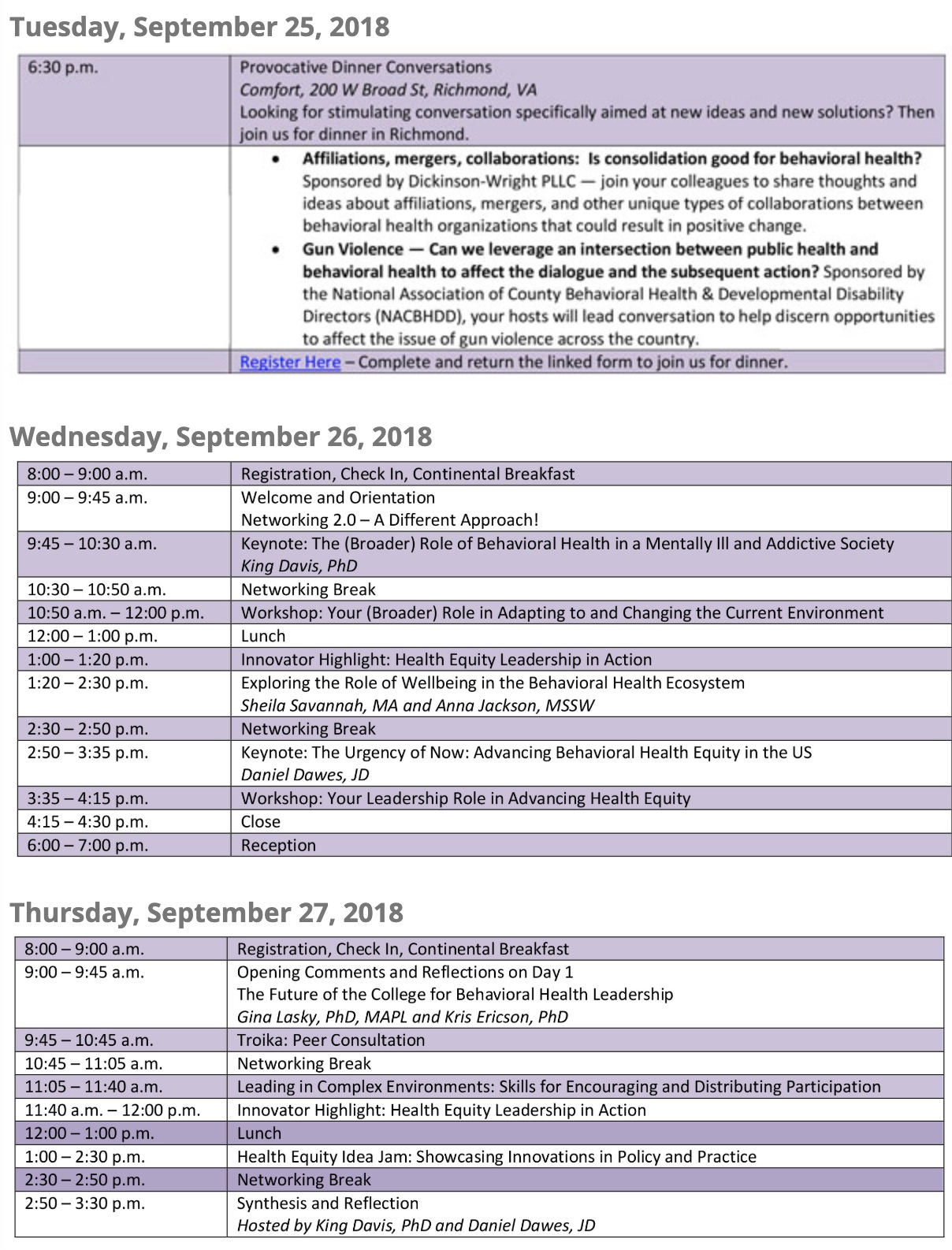LEADING DIFFERENTLY: LEVERAGING POWER DYNAMICS TO OPTIMIZE CHANGE
Our work as behavioral health leaders happens in the broader contexts of population health and behavior change. This reality both requires our attention and demands our expertise. We must assess and consider whose voices have the power and position to influence decisions in clinical practice and policy processes. Whose voices can we hear clearly? Who is absent from the table? Who needs an invitation? What can’t we see clearly? Who can help change that?
#metoo + #timesup + #blacklivesmatter + #studentsagainstguns
What story does each of these powerful social movements tell? How and where do they intersect with our work and reframe the way we lead? How will they inform us moving forward as we consider where we live and how we work?
The effective promotion of healthy communities requires us to consider the intersection of power, privilege, and the many realms of diversity for which we know health equity is largely dependent – race, geography, generation, ability, class, gender, sexual orientation, religion, and more. Let’s do it together.
Join us for Summit in Richmond at Virginia Union University (VUU) for the kind of rich and critical dialogue we all expect at this annual gathering. VUU is an historically black college, founded in 1865 to give newly emancipated slaves an opportunity for education and advancement. Its powerful history will not be lost on us as we gather and explore these important questions.
Participants will:
- Cultivate relationships with behavioral health leaders from every corner and system in our country.
- Explore the roles of multiple behavioral health sectors in producing and reversing inequity in health and wellbeing.
- Develop skills for leading in complex and changing environments.
SUMMIT MATERIALS
Our Summit speakers and innovators have provided copies of their presentations and handouts, which are available from the links below. We have received most, but not all, handouts and presentations. Contact information for any our speakers and innovators can be obtained by contacting the office. If you don’t find something that you’re looking for, please contact the office and we will help obtain it for you, if possible.
- 2018 Summit Design Storyboard and House Slides – Anna Jackson
- “There Is No Nobel Prize for Plumbers” – King Davis, PhD
- Workshop Notes – Your Broader Role
- “Open Source Wellness: Health Powered by Connection” – Liz Markle, PhD
- “Gould Farm: Harvesting Hope, Promoting Recovery” – Jose Villegas
- Telecare Corporation Health Education Campaign – Shannon Mong, PsyD
- Telecare Corporation Health Education Campaign Posters – Shannon Mong, PsyD “
- “Improving Health in Rural Counties: Local Communities Address Social Determinants of Health” – Marianne Burdison, LCSW
- “Yoga as a Healthcare Innovation” – Allie Middleton, JD, LCSW, E-RYT, C-IAYT
- “Integrating Yoga Into Community” – Allie Middleton, JD, LCSW, E-RYT, C-IAYT
- “The College Experience, Redefined: The Wellness Environment at the University of Vermont” – Zoe Adams
SUMMIT AGENDA
Over the two days of Summit, you will connect with other participants in a way that fosters understanding, sparks creativity, and facilitates the adoption of new practices. The Summit has been designed in such a way that each of us can quickly learn where and how new ideas are being used and how they might be adapted to our own situations, gain insight on issues we face, and unleash local wisdom for addressing complex challenges. We will consult with colleagues and hear from leaders in the field and, together, shape the future of behavioral health in a rapidly evolving social environment. Use this link to access a PDF of the Summit agenda.

King Davis, PhD
Professor, School of Information
The University of Texas at Austin
King Davis was appointed professor of research in the School of Information at the University of Texas (UT) at Austin in 2014. He is the principal investigator for an $800,000 multi-disciplinary digital archives project at Central State Hospital in Petersburg, Virginia, America’s first mental hospital for newly freed slaves. King was the inaugural director of the Institute for Urban Policy Research & Analysis and holder of the Mike Hogg Endowed Chair in urban affairs from 2011 – 2014 at UT. He served as Executive Director of the Hogg Foundation for Mental Health from 2003 – 2008 and he held the Robert Lee Sutherland Endowed Chair in Mental Health, Law, and Social Policy in the UT School of Social Work from 2000 – 2008. He is a former Commissioner of the Virginia Department of Mental Health, Mental Retardation and Substance Abuse Services serving in the L. Douglas Wilder Administration from 1990 – 1994. He held endowed chairs in the Departments of Psychiatry and Behavioral Science at the University of Virginia, Medical College of Virginia, and Eastern Virginia Medical School. He was a professor of social policy at Virginia Commonwealth University School of Social Work from 1985 – 1999 and Norfolk State University School of Social Work from 1975 – 1985. King held the rank of Captain and chief of social work services for Walson Army Hospital at Ft. Dix NJ and director of the CHAMPUS military insurance program during the Viet Nam War.
Daniel E. Dawes, JD
Executive Director of Government and Health Affairs Policy
Morehouse School of Medicine
Attorney Daniel E. Dawes is a nationally recognized leader in the health equity movement and has led numerous efforts to address health policy issues impacting vulnerable, underserved, and marginalized populations. He is a health care attorney and administrator, and serves as the executive director of government affairs and health policy at Morehouse School of Medicine. He is also a lecturer of health law and policy at the Satcher Health Leadership Institute. Dawes was instrumental in shaping the Affordable Care Act (ObamaCare) and founded and chaired the largest advocacy group, the National Working Group on Health Disparities and Health Reform, focused on developing comprehensive, inclusive and meaningful legislation to reform the health care system and address the disparities in health care and health status among racial and ethnic minorities, people with disabilities, women, children, LGBT individuals, and other vulnerable groups in the United States. He is the co-founder of the Health Equity Leadership and Exchange Network (HELEN), which is a national network of health equity champions in virtually every state and territory. Dawes often lectures and presents on health law and policy while serving simultaneously on several boards, commissions, and councils focused on health equity and health reform. He is an advisor to international, national, regional, state and municipal policymakers, as well as think tanks, associations, foundations, corporations, and nonprofit organizations.
Sheila Savannah, MA
Director
Prevention Institute
Sheila Savannah is a Director with the Prevention Institute, where she provides leadership on health equity, mental health, and violence prevention. In her leadership role on mental health, she focuses on its intersection with social connection, community resilience, and the social determinants of health. Currently, she guides Making Connections, a mental health initiative aimed at improving outcomes for boys and men – particularly men and boys of color, service members, and veterans – addressing trauma through a public health approach to mental wellbeing. With over 30 years in the field, she has expertise in multi-sector collaboration and youth/family engagement in addressing complex system issues of safety and equity and brings a unique perspective to this important work.
Anna Jackson, MSSW
Alpinista Consulting
Summit Facilitator
Anna Jackson, MSSW, is a consultant specializing in participatory approaches to leading change, strategy development, and person-centered practices. She holds a Master of Science in Social Work from The University of Texas at Austin and a Bachelor of Arts in Social Anthropology from the University of California, Davis. Before founding Alpinista Consulting in 2014, Anna served as Deputy Director of Via Hope, a training and consultation center whose mission it is to transform the Texas mental health system into one that is person-centered and recovery oriented. From 2011 to 2014, she led the development of their programs, managing collaborative learning initiatives that integrate implementation science and participatory change methods, helping organizational teams work with complexity while implementing practices like peer support and person-centered planning. Ms. Jackson incorporates a social justice framework in her practice and has worked in youth engagement, leadership development, experiential education, healthcare services and systems change, and international domestic violence and human trafficking prevention and intervention. As a young adult, Anna led experiential youth leadership programs in the Sierra Nevada. These formative experiences contributed to her passion for approaches that emphasize collective, distributive, and participatory leadership, and led her to complexity science and Liberating Structures, essential elements of Alpinista’s offerings.


